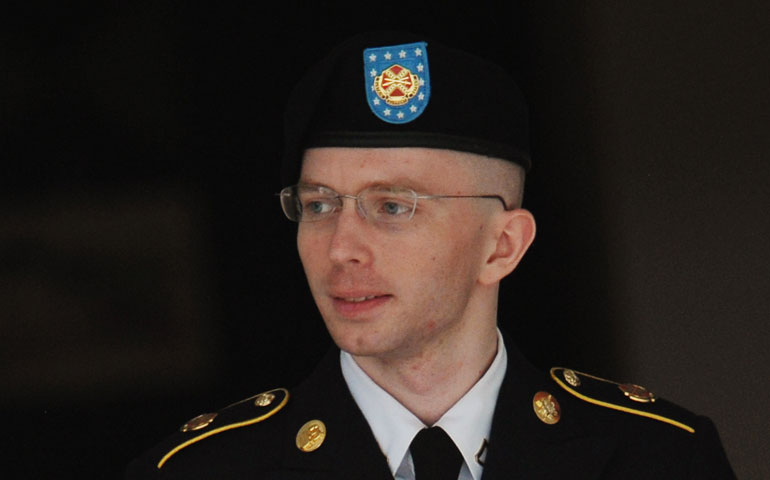
Army Pfc. Bradley Manning is escorted from court July 25 in Fort Meade, Md. (Getty Images/AFP/Mandel Ngan)
Editor's note: Colman McCarthy wrote this column for the Aug. 30-Sept. 12 print edition, which went to press before Chelsea Manning, formerly known as Bradley Manning, announced her decision to live as a woman. As such, the column does not reflect Manning's decision.
It could happen someday, but as of now shaming and embarrassing the United States government is a not a federal crime. Current shamers and embarrassers are Bradley Manning and Edward Snowden. Both released to the public documents that government officials in the National Security Agency, the CIA, the Pentagon and the Obama White House sought to keep secret and classified under the all-purpose rubrics of national security and preventing terrorist attacks.
Manning is the 25-year-old Army private who made public, via the invaluable Wikileaks organization, a trove of military and diplomacy documents that exposed a sorry record of deceit and violence. The public owes Manning a debt for revealing a riveting Army-made but Army-hidden film of an Apache helicopter crew killing unarmed civilians on a Baghdad street. "Collateral Murder" is available on YouTube.
Snowden, 30, who worked as a contractor for the National Security Agency, leaked information that the privacy of Americans is under siege by the NSA's surveillance program, which has been gathering data on people's phone calls down to the numbers dialed, the length of the conversations and the dates.
The civil disobedience of Manning and Snowden show them to be men of conscience and courage. They saw wrongs and tried to right them.
They saw government power gone wild and tried to tame it. They saw shadows and shined lights. Snowden decided to tell the truth and run to Russia for now. In Manning's case, he has undergone three years' imprisonment, including harsh solitary confinement. In late July, he was found guilty of most of the charges against him but not of the most serious: aiding the enemy. On Aug. 21, Manning was sentenced to 35 years in prison.
By many people's lights, including mine, the truly sinister aiding is to be found in the American interventionist foreign policy of habitually invading countries like Afghanistan. The violence amounts to recruiting gifts for al-Qaida and the Taliban. The more who are killed, whether by ground fire or missiles from drones, the easier it is for the enemy to increase its ranks to take on the United States, the Great Satan. Enemies are being made faster than they can be killed. The policies of the Bush and Obama administrations (the similarities grow and grow) have been combustibles that keep the fires of anti-American hatred burning.
Shamed and embarrassed by the two whistleblowers, scalp-hunting prosecutors have predictably demonized the pair as traitors, misfits guilty of treason, and (here's the clincher) anarchists. The smearing brings to mind Richard Nixon's 1971 slander against Daniel Ellsberg and his allies when they gave The New York Times classified documents about the Vietnam War, the Pentagon Papers. "Hell," Nixon fumed over the phone to an aide, "I wouldn't prosecute the Times. My view is to prosecute the goddamned pricks that gave it to them."
The basic issue in the Manning and Snowden cases is accountability.
Is it moral for public officials to decide for themselves, untethered, how, when and where to use the country's immense military, diplomatic and surveillance power -- regardless of who dies, is impoverished or is denied their civil and human rights? Stamping "classified" on vast amounts of documents assures a thick wall of secrecy behind which anything goes.
Roughing up whistleblowers has become a passion for the Obama administration, according to recent stories in The Nation and The Washington Post. Employees of the CIA, the FBI and the NSA who went public with information of agency abuses have been fired, harassed and retaliated against.
Among them was Jesselyn Radack, bounced from the Justice Department for exposing malfeasance but never prosecuted. An attorney, she now works for the Government Accountability Project, an advocacy nonprofit in Washington. Part of her job is counseling whistleblowers who come in "bankrupt, blacklisted and broken," she told The Washington Post. "Once you are labeled that way [as a whistleblower], you are just radioactive."
In June, Mairead Maguire, the Irish Nobel Peace Prize winner, nominated Manning for the same award. "The United States," she said, "the most militarized country on earth, should stand for something better than wars. ... By heeding Pfc. Bradley Manning's message on the importance of transparency, America's government can once again rebuild its image in the eyes of the world, and spread democracy not through foreign invasions, but through setting a strong example."
If Barack Obama could win a Nobel Peace Prize for making eloquent speeches and Al Gore for producing an environmental film, Bradley Manning is all but a shoo-in.
[Colman McCarthy directs the Center for Teaching Peace in Washington and teaches courses on nonviolence at four universities and two high schools.]




